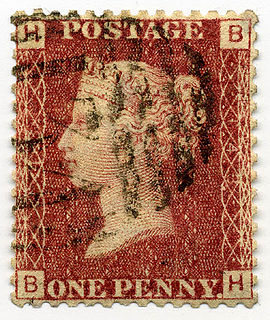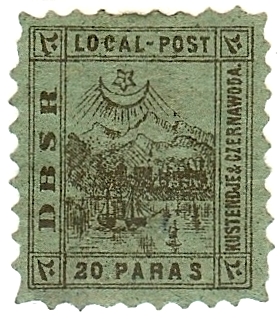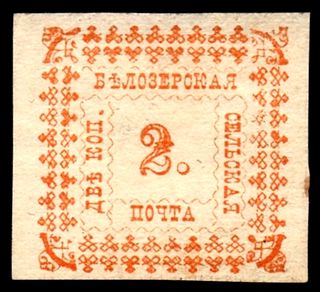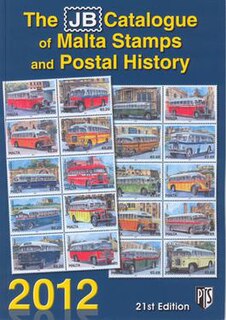
Philately is the study of postage stamps and postal history. It also refers to the collection, appreciation and research activities on stamps and other philatelic products. Philately involves more than just stamp collecting or the study of postage; it is possible to be a philatelist without owning any stamps. For instance, the stamps being studied may be very rare or reside only in museums.

A cancellation is a postal marking applied on a postage stamp or postal stationery to deface the stamp and to prevent its reuse. Cancellations come in a huge variety of designs, shapes, sizes, and colors. Modern cancellations commonly include the date and post office location where the stamps were mailed, in addition to lines or bars designed to cover the stamp itself. The term "postmark" refers specifically to the part that contains the date and posting location, but the term is often used interchangeably with "cancellation" as it may serve that purpose. The portion of a cancellation that is designed to deface the stamp and does not contain writing is also called the "obliteration" or killer. Some stamps are issued pre-cancelled with a printed or stamped cancellation and do not need to have a cancellation added. Cancellations can affect the value of stamps to collectors, positively or negatively. Cancellations of some countries have been extensively studied by philatelists, and many stamp collectors and postal history collectors collect cancellations in addition to the stamps themselves.

The Joy of Sex is a 1972 illustrated sex manual by British author Alex Comfort. An updated edition was released in September 2008.

A local post is a mail service that operates only within a limited geographical area, typically a city or a single transportation route. Historically, some local posts have been operated by governments, while others, known as private local posts have been for-profit companies. Today, many stamp collectors operate hobbyists' local posts, issuing their own postal "stamps" for other collectors but rarely carrying any mail.

The British post offices in Morocco, also known as the "Morocco Agencies", were a system of post offices operated by Gibraltar and later the United Kingdom in Morocco.

Douglas James Davies, is a Welsh Anglican theologian, anthropologist, and academic, specialising in the history, theology, and sociology of death. He is Professor in the Study of Religion at the University of Durham. His fields of expertise also include anthropology, the study of religion, the rituals and beliefs surrounding funerary rites and cremation around the globe, Mormonism and Mormon studies. His research interests cover identity and belief, and Anglican leadership.

In general, philatelic fakes and forgeries are labels that look like postage stamps but have been produced to deceive or defraud. Learning to identify these can be a challenging branch of philately.
The Bookseller/Diagram Prize for Oddest Title of the Year, originally known as the Diagram Group Prize for the Oddest Title and commonly known as the Diagram Prize, is a humorous literary award that is given annually to a book with an unusual title. The prize is named after the Diagram Group, an information and graphics company based in London, and The Bookseller, a British trade magazine for the publishing industry. Originally organised to provide entertainment during the 1978 Frankfurt Book Fair, the prize has since been awarded every year by The Bookseller and is now organised by the magazine's diarist Horace Bent. The winner was initially decided by a panel of judges, but since 2000 the winner has been decided by a public vote on The Bookseller's website.

The postage stamps and postal history of Israel is a survey of the postage stamps issued by the state of Israel, and its postal history, since independence was proclaimed on May 14, 1948. The first postage stamps were issued two days later on May 16, 1948. Pre-1948 postal history is discussed in postage stamps and postal history of Palestine.

The Philatelic and Postal Museum of Greece is a museum dedicated to the philately and postal history of Greece located in Athens, at the junction of Stadiou Square and Fokianou Street, next to the Panathenaic Stadium (Kallimarmaro).
Gary Sidney Ryan (1916–2007) was an eminent philatelist who specialised in the stamps and postal history of Hungary and later in revenue stamps.
The Bookseller is a British magazine reporting news on the publishing industry. Philip Jones is editor-in-chief of the weekly print edition of the magazine and the website. The magazine is home to the Bookseller/Diagram Prize for Oddest Title of the Year, a humorous award given annually to the book with the oddest title. The award is organised by The Bookseller's diarist, Horace Bent, and had been administered in recent years by the former deputy editor, Joel Rickett, and former charts editor, Philip Stone. We Love This Book is its quarterly sister consumer website and email newsletter.

A Zemstvo stamp was a Russian local stamp used widely in rural areas from 1865. It was named after the Zemstvo local administrative districts or uyezds that were created in 1864. The stamps ceased at about the time of the 1917 Russian revolution.

This is a survey of the postage stamps and postal history of Egypt.
The Hellenic Philotelic Society is a philatelic organisation in Athens devoted to promoting the philately of Greece and the Greek area.

The J.B. Catalogue of Malta Stamps and Postal History is Malta's leading stamp catalogue. It was first published in 1984 and is published bi-annually by Joseph Buttigieg of Sliema Stamp Shop. It is currently in its twenty-second edition (2014). The catalogue originally used the SG numbering system, but from the early 1990s it had separate numbering. It is in English and the prices were denominated in Maltese pounds until 2006, and euros from 2008.

The Greek god Hermes, messenger of the Gods in the Greek mythology, is the representation chosen, in 1860, by the Kingdom of Greece to illustrate its first postal stamps.

Coded postal obliterators are a type of postmarks that had an obliterator encoded with a number, letter or letters, or a combination of these, to identify the post office of origin. They were introduced in the United Kingdom of Great Britain and Ireland in 1843, three years after the first stamp was issued. They became common throughout the nineteenth century but very few remained in use until the twentieth century.

Living with Crazy Buttocks is a book written by Australian author and cartoonist Kaz Cooke and published by Penguin Books on November 19, 2001. It won the 2002 Bookseller/Diagram Prize for Oddest Title of the Year.

How to Avoid Huge Ships is a 1982 book by Captain John W. Trimmer, a Master Mariner and Seattle harbor pilot. The first edition was self-published from Trimmer's home in Seattle, and carried the subtitle Or: I Never Met a Ship I Liked. It is a maritime operations guidance book, but also attracted some attention due to its title, which some found to be unusual, incongruous, and humorous.















